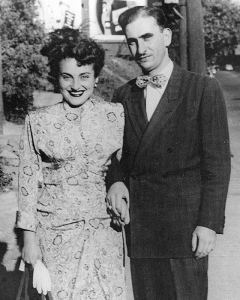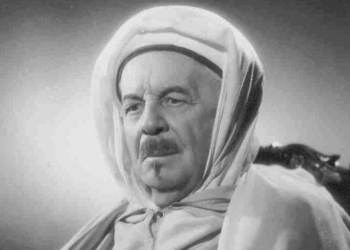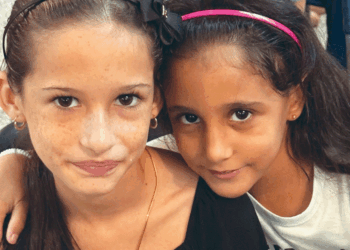As the generation of my parents leave us, we, the children of the survivors, must raise our voices against tyranny, bullying and discrimination
By JANET HORVATH
I am the daughter of Katherine Horvath (of blessed memory) and George Horvath, survivors of the Holocaust. For many years I, like my parents, was reluctant to speak about the horrific days of World War II.
Now, as that generation leaves us, I feel compelled to tell and retell my parents’ story so it stays “real,” rather than relegated to a myth of history; to learn as much about those times as I can, so I can pass on this knowledge to later generations who won’t have firsthand experience.
Remembrance
My parents were born in Budapest, Hungary, and both of them were professional musicians. People remember my mom as the most stylishly dressed of women. She was a gorgeous and outgoing lady with large green eyes, never leaving the house without her makeup on and her hair coiffed. Though petite in stature, at barely five feet tall, she had a fiery, strong personality and she was formidable — demanding and critical if we didn’t live up to her expectations.
When she was a young lady, she attracted men like a magnet. She was a piano and singing student at the famous Budapest Liszt Academy, and it was my dad, George, who won her favor, brandishing free tickets to the Budapest Symphony, of which he was a member at the tender age of 22.
At this time, though, Europe was gripped by Nazi terror. When my brother and I were growing up, my parents rarely talked of their experiences. The stories I did know had to be pieced together through snippets here and there. Unfortunately, my mom’s life was drastically changed at the age of 75, when she suffered a pervasive stroke. She never spoke another word and her stories were lost. My father, who is now 87, is anxious to share as much as he can remember of those horrifying years.
The Jews of Budapest were very assimilated and successful members of society. As early as the year before my mother was born, anti-Semitism was on the rise. The Numerus Clausus laws were enacted in 1924, limiting Jewish university enrollment at six percent. Soon Jews were not allowed telephones, radios or pets. In the summer of 1941, immigrant Jews living in Hungary were deported and massacred.
Hungary was allied with Germany during World War II. Thus it was not until 1944 that Hungarian Jews became targets. My parents’ lives were irrevocably changed when the Nazis invaded Hungary on March 19, 1944. My father remembers it clearly. He was a cellist with the Budapest Symphony and during a Sunday afternoon performance, the dreaded SS marched into the concert hall and demanded that everyone leave; public gatherings were declared illegal.
Soon after, on March 22, all Jewish shops were ordered closed; and on April 5, Hungarian Jews were ordered to wear the yellow Star of David. Later that month the Jews, including my mother, were forced into ghettos.
On May 27, my father was taken away on the last transport that went to the copper mines of Bor, Yugoslavia, to work as a slave laborer. He was lucky. One hour later and he would have been on a train to Germany. Between May and July 1944, almost a half-million Hungarian Jews were deported to Auschwitz.
Jews were rounded up by age groups, as well as by sex. When women younger than 40 were ordered to appear together in a large arena, my savvy uncle instructed his younger sister, my mother, to keep moving from row to row and to study what was happening. The pregnant women, the women with small children and the ill women were sent to one group; the strong ones and the beautiful young women were sent to another. The selections were made in the pouring rain all that day, and continued during the following days. My uncle realized the peril and he urged my mother not to return to the arena.
She took her chances hiding in basements and abandoned bombed apartments, covering herself with lumber during door-to-door searches by the Nazis. She was fearless and tenacious.
When she had to go out into the streets searching for food, she took off the required yellow star and carried forged documents, which we believe were procured through the underground efforts of the Swedish diplomat Raoul Wallenberg. His clandestine activities included forging Swedish documents for the Jews of Budapest and creating Swedish safe houses, where for a few nights, women and children could hide. My mother and grandmothers were among these people.
My mother kept herself alive by foraging through the wreckage for nails and other hardware to trade for food.
Meanwhile, in the copper mine, my father worked with a pickax, filling wheelbarrows with earth and stones, and subsisting on minimal rations of black bread and watery soup. He worried about his hands and tells of a sympathetic guard who, upon hearing that he was a musician, gave him a pair of gloves.
Miraculously, he was still alive when the Serbian partisans liberated his camp as the war was ending. Somehow he made his way back to Budapest on foot through the forests, hiding until the Soviets liberated Budapest in 1945. He had no idea if he would find my mother and his parents alive.
How they found each other after the war is a mystery. How they escaped from Hungary to Munich, where they could embark to the New World, was a feat of bravery, leaving behind parents, a beloved brother and all material things. In Munich they joined countless other refugees waiting for exit visas from a devastated Europe.
My father, since he was a talented young cellist, was recruited by the United Nations relief organization, in 1947, to join a small group of musicians to form an orchestra. They performed concerts in the displaced persons (DP) camps for survivors of Nazi terror; they were paid with American canned goods, chocolate, coffee and tobacco, which could be traded for additional necessities.
Recently I innocently asked my father if he had ever performed with the famous conductor, pianist and musical icon Leonard Bernstein. He surprised me with the following story:
On May 11, 1948, Leonard Bernstein took time from a European tour to conduct this group of fantastic musicians — 17 Jewish displaced persons, all Holocaust survivors, in two concerts in the Landsberg and Feldafing DP Camps in Germany. My father was one of those musicians. The program included Gershwin’s “Rhapsody in Blue,” with Bernstein at the piano. My father remembers it as being “just fantastic.” Despite the fact that Bernstein was such a young man at the time, he was a wonderful conductor and his playing was superb.
My father remembers that it was a very hot day; they were set up on the gravel outdoors. Bernstein commented that since they were all shvitzing (sweating), they should all take off their jackets and roll up their sleeves. My father had a conversation with Bernstein. He said that he wanted to come to America. Bernstein’s response was that my father was a great Jewish musician and that he should consider going to Palestine.
Bernstein spoke to the moral power of music and its continuing importance to my father, and to all of humanity. Music saved my parents’ lives and inspired other survivors to continue living. Yes, there still was beauty in the world.
As the generation of my parents leaves us, we, the children of the survivors, must raise our voices against tyranny, bullying and discrimination. Our memorials and our tributes during Yom HaShoah are only adequate if we preach beyond the choir. I regard myself now as a survivor by proxy, and I intend, through my music and my words, to relate these true stories, so the phrase “never again” becomes a reality.
Today, there are countless excellent books and movies available recounting equally harrowing and inspiring stories of survival. Museums all over Europe are dedicated to the people lost during the Shoah. But books and movies only go so far.
There is good work being done today by righteous gentiles. Two examples are the work of the Southern Poverty Law Center, which created the Teaching Tolerance curriculum for schools; and the Swedish singer Ben Olander, who travels worldwide to teach about the heroic efforts of one man, Raoul Wallenberg. Teaching tolerance is still of the utmost urgency.
I think Bernstein’s sentiments sum it up most eloquently.
In his memoir, Bernstein wrote: “Our pens, voices, paintbrushes, pas de deux; our words, our C sharps and B flats, can shoot up far higher than any oil well, can break down self-interest, can reinforce us against moral deterioration. Perhaps, after all, it is the artist who can reconcile the mystic with the rational, and who can continue to reveal the presence of God in the minds of men.”
***
Janet Horvath is the Minnesota Orchestra’s associate principal cello. She will perform April 21 at the annual Twin Cities Yom HaShoah commemoration at Beth El Synagogue.





















Janet Horvath’s story of her parents’ survival and triumph during and after the war is both remarkable and part of the thousands of our parents’ stories that must be told. Through her art and life, Janet has continued her parents’ legacy and has brought beauty and undestanding to the world.
Kol hakavod and todah rabah, Janet, Your dear fiend, Anat
Anat,
Your comment brought tears to my eyes. Thank you. This article has made my father very proud and reassured, that the stories will be carried on into the future.
warmly Janet
This past weekend I spent several hours at the Holocaust Museum in Washington DC. Janet’s parents’ story and the stories at the Museum are important to remind us of the beauty, strength and goodness in this world. Also, they remind us of how easy it is to ignore or deny evil & intolerance. We must always find the strength to stand up for what connects us and elevates us as humans. Thank you, Janet, for your musicianship & friendship.
Dear Janet, you email reached me while I was in Poland on yet another March of the Living, this time with two of my oldest grandchildren 22 years old. The trip was laden with emotions on the demise of our people but it was also filled with the joy of life that you so wonderfully described, the life before the deportation. It is very important that the legacy and contributions of our people be told as you have. It is not enough to tell as how we suffered and how many people were murdered but to tell the world how great is the loss to the world by virtue of the murder of so many talented and great people. The world will never know the real cost of what the Shoah has been. Thank you for doing this. It is a wonderful tribute to your parents. keep on speaking writing and playing and playing. I your own words music is the reflection of the inner spirit of the human beings. Warmest regards, Bernice and Nate,
Janet, your father was my cello teacher for several years when I was in high school (late 70s – early 80s). During our lessons he often told me about his experiences in the camps and after the war. I wish I remembered more. He also spoke about you and told me how happy he was that you were a musician. His perseverance and strength of character made a strong impression on me. I have told my own son about him. I will remember your parents fondly.
Jennifer